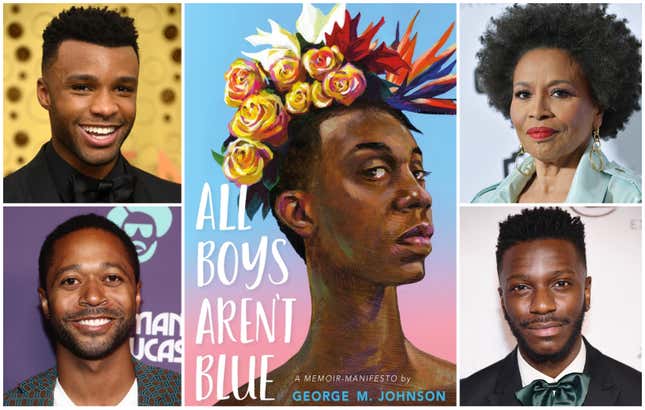
Last year may not have brought an abundance of pleasures, but one of its standouts was George M. Johnson’s literary debut, All Boys Aren’t Blue. The Root 100 honoree’s “memoir-manifesto” not only became an instant bestseller and Amazon Best Book of the Year honoree but garnered a development deal with Gabrielle Union’s production company, soon to be adapted for Sony TV.
We can’t wait to see how Johnson’s poignant coming-of-age story and charismatic family translate to the screen—but in the meantime, we can get a taste. In honor of National Black HIV/AIDS Awareness Day (NBHAAD), All Boys Aren’t Blue is getting another onscreen treatment, recruiting a small bounty of Black excellence to bring chapters of Johnson’s bestseller to life as part of the AIDS Healthcare Foundation’s BLACC/NBHAAD programming.
Under the direction of award-winning filmmaker and author Nathan Hale Williams, on Monday, Feb. 8, three chapters of All Boys Aren’t Blue will be presented in a 30-minute, broadcast-quality staged and filmed reading, with Johnson portrayed by a different actor in each segment: Dyllón Burnside (Pose), Bernard David Jones (Uncorked, The Mayor) and Thomas Hobson (Stone Fruit, Sherman’s Showcase), respectively. Rounding out the cast will be “Mother of Black Hollywood” Jenifer Lewis (Black-ish) in the role of Johnson’s beloved “Nanny.”
For those unfamiliar with Johnson’s Young Adult bestseller, the following chapters of their book will be performed, per a press release:
- Chapter 1 – “Smile” – This chapter chronicles the incident that led to Johnson having their teeth knocked out and challenges around being able to find their smile. (Dyllón Burnside)
- Chapter 7 – “Nanny: The Caregiver, the Hustler, My Best Friend” – This chapter chronicles Johnson’s close relationship with their confidante and saving grace, grandmother (aka Nanny). (Bernard David Jones)
- Chapter 14 – “Caught in a Haze” – This chapter chronicles Johnson’s pledging of Alpha Phi Alpha Fraternity, Inc. and further exploration of masculinity, as well as their relationship to traditional masculine constructs. (Thomas Hobson)
Following the reading, Johnson, a former community healthcare worker and current HIV activist who has publicly chronicled his own journey with the virus, along with Grammy Award-winning musician Pastor Shep Crawford and non-binary creative and healer Twiggy Pucci Garçon, will take part in a 30-minute panel discussion moderated by influencer-entrepreneur Tai Beauchamp. The evening’s theme? “Stigma Gotta Go.”
“It’s so critical for the entire Black community to come together to end the stigma around HIV/AIDS,” said director Nathan Hale Williams in a statement provided to The Root. Notably, Williams’ acclaimed 2016 film 90 Days explored the stigma of HIV through the lens of a heterosexual couple, driving home the reality that this is not an exclusively LGBTQ issue. His statement continued:
Stigma prevents people from getting tested, knowing their status and seeking treatment, if necessary. HIV hasn’t been just ‘a queer person’s virus’ for decades and it’s time that we work as a unit to save ourselves and our community. While other communities have seen their infection rates decrease, the rates in the Black community continue to increase. It’s our collective challenge that must be met with a collective effort.
Our goal is to move out the fear that creates stigma and replace it with love through these amazing performances, the virtual celebration of our uniqueness & art as well as the frank and sobering discussion that needs to be had. The divide between the Black community and its queer brothers & sisters is at the root of many of our issues and is an impediment to our fight against HIV/AIDS AND stigma.
To that end, All Boys Aren’t Blue is an event not to be missed—and should be shared with the family, as Johnson’s memoir was written for ages 14 and up. Registration is open for the event now; all registrants will subsequently receive links to tune in on February 8.
“George Matthew Johnson’s transparent and sparkling memoir is the perfect centerpiece for this day of awareness,” said Hale Williams. “The way in which he unapologetically and skillfully chronicles his story of growing up Black and queer in America, challenging gender identity norms as well as learning to adapt to HIV/AIDS is indeed a manifesto for our entire community to rise up and finally say, ‘Stigma Gotta Go.’”

